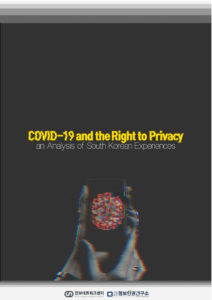 [ENGLISH / PDF] Covid 19 and the right to Privacy an analysis of South Korean Experiences
[ENGLISH / PDF] Covid 19 and the right to Privacy an analysis of South Korean Experiences
The Korean government is promoting international standardization, naming it the “K-Qaurantine Model”. The Korean government described the 'K- Qaurantine model' as a 3T (Test-Trace-Treat) which are '① test/confirmation→② epidemiology/tracking→③ quarantine/treatment'. It is based on identifying contacts by a precise epidemiological investigation of infectious disease patients, quarantining suspected COVID-19 patients and conducting active diagnostic tests. However, in this process, the sensitive personal information such as medical conditions, travel history, sexual orientation and private relations are collected, processed and disclosed, leading to controversy over personal information infringement.
It is difficult to conclude that the Korean model is more repressive in that restrictions on the right to liberty of movement are also limitations on fundamental rights. But before concluding that strong surveillance measures are effective in responding to infectious diseases, we need a rigorous analysis on whether the collection of personal information and the use of surveillance technology really worked in responding to COVID-19, whether there were other larger factors that influenced the success of quarantine, or whether it is possible to improve the Korean model in a less invasive way.
This report is an outcome of the research conducted by Korean Progressive Network Jinbonet and Institute for Digital Rights, and sponsored by Association for Progressive Communications.
For more information, please visit :
https://act.jinbo.net/
Contact :
Byoung-il Oh : antiropy@gmail.com
Contents
1. Introduction
2. Human Rights Principles in times of infectious disease crisis
3. Korean legislation for processing personal information in responding to infectious diseases
4. Digital Rights Issues in COVID-19 Response
(1) Epidemiological investigation and contact tracing of infectious disease patients
(2) Disclosure of movement paths of confirmed patients
(3) Monitoring of self-quarantine
(4) Mandatory entry log system
5. Conclusion
(1) The need for independent supervision
(2) The material basis of K-quarantine
(3) Has the ROK succeeded in quarantine against COVID-19?
